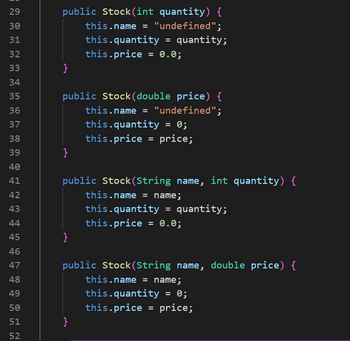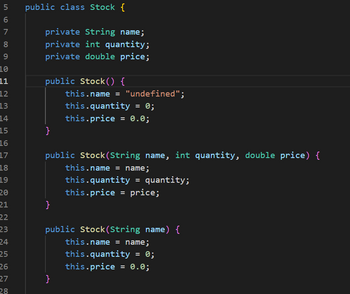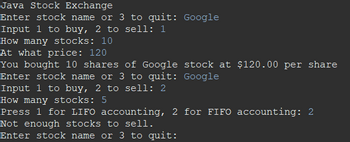
Given the following code in Java and attached images( containing related code):
“sellLIFO” and “sellFIFO” methods.
2. Provide error checking so users can’t sell a stock they don’t own or
try to sell more stock than they own. Eliminate that runtime exception.
3. We think its sort of limited to only work with just two stocks. You
need to change the user input, so the user enters the stock name they
wish to buy or sell instead of just choosing between Google and
Amazon. Keep the command line interface since we are only in the
testing phase.
4. We like the layout and design of the application so don’t change any
of the other methods or objects. Only edit the Controller.java file!


Trending nowThis is a popular solution!
Step by stepSolved in 6 steps with 6 images

Given the code:
import java.util.HashMap;
import java.util.LinkedList;
import java.util.Scanner;
public class Controller {
privateHashMap<String,LinkedList<Stock>>stockMap;
publicController(){
stockMap=newHashMap<>();
Scannerinput=newScanner(System.in);
do{
// Prompt for stock name or option to quit
System.out.print("Enter stock name or 3 to quit: ");
StringstockName=input.next();
if(stockName.equals("3")){
break;// Exit if user inputs '3'
}
// Get or create a list for the specified stock
LinkedList<Stock>stockList=stockMap.computeIfAbsent(stockName,k->newLinkedList<>());
// Prompt to buy or sell
System.out.print("Input 1 to buy, 2 to sell: ");
intcontrolNum=input.nextInt();
System.out.print("How many stocks: ");
intquantity=input.nextInt();
if(controlNum==1){
// Buying stocks
System.out.print("At what price: ");
doubleprice=input.nextDouble();
buyStock(stockList,stockName,quantity,price);
}else{
// Selling stocks
System.out.print("Press 1 for LIFO accounting, 2 for FIFO accounting: ");
controlNum=input.nextInt();
if(controlNum==1){
// Sell using LIFO method
sellLIFO(stockList,quantity);
}else{
// Sell using FIFO method
sellFIFO(stockList,quantity);
}
}
}while(true);
input.close();// Close the scanner
}
publicstaticvoidbuyStock(LinkedList<Stock>list,Stringname,intquantity,doubleprice){
// Create a new stock object and add it to the list
Stocktemp=newStock(name,quantity,price);
list.push(temp);
// Display purchase details
System.out.printf("You bought %d shares of %s stock at $%.2f per share %n",quantity,name,price);
}
publicstaticvoidsellLIFO(LinkedList<Stock>list,intnumToSell){
// Check if there are enough stocks to sell
inttotalQuantity=list.stream().mapToInt(Stock::getQuantity).sum();
if(totalQuantity<numToSell){
System.out.println("Not enough stocks to sell.");
return;
}
doubletotal=0;
doubleprofit=0;
intremainingToSell=numToSell;
while(remainingToSell>0){
// Retrieve and sell stocks using LIFO
StocklastStock=list.peek();
if(lastStock.getQuantity()<=remainingToSell){
remainingToSell-=lastStock.getQuantity();
total+=lastStock.getPrice()*lastStock.getQuantity();
profit+=lastStock.getPrice()*lastStock.getQuantity();
list.pop();// Remove stock from the list
}else{
lastStock.setQuantity(lastStock.getQuantity()-remainingToSell);
total+=lastStock.getPrice()*remainingToSell;
profit+=lastStock.getPrice()*remainingToSell;
remainingToSell=0;
}
}
// Display sale details
System.out.printf("You sold %d shares of %s stock at %.2f per share %n",numToSell,list.peek().getName(),total/numToSell);
System.out.printf("You made $%.2f on the sale %n",profit);
}
publicstaticvoidsellFIFO(LinkedList<Stock>list,intnumToSell){
// Check if there are enough stocks to sell
inttotalQuantity=list.stream().mapToInt(Stock::getQuantity).sum();
if(totalQuantity<numToSell){
System.out.println("Not enough stocks to sell.");
return;
}
doubletotal=0;
doubleprofit=0;
intremainingToSell=numToSell;
while(remainingToSell>0){
// Retrieve and sell stocks using FIFO
StockfirstStock=list.peekLast();// Get the first element (FIFO)
if(firstStock.getQuantity()<=remainingToSell){
remainingToSell-=firstStock.getQuantity();
total+=firstStock.getPrice()*firstStock.getQuantity();
profit+=firstStock.getPrice()*firstStock.getQuantity();
list.removeLast();// Remove stock from the list (FIFO)
}else{
firstStock.setQuantity(firstStock.getQuantity()-remainingToSell);
total+=firstStock.getPrice()*remainingToSell;
profit+=firstStock.getPrice()*remainingToSell;
remainingToSell=0;
}
}
// Display sale details
System.out.printf("You sold %d shares of %s stock at %.2f per share %n",numToSell,list.peekLast().getName(),total/numToSell);
System.out.printf("You made $%.2f on the sale %n",profit);
}
}
Rewrite without using Hashmap, but just stick with the LinkedList instead! The output should display the profit made from sales!
If I bought 30 stocks of Google for 120 then I decide to sell 5 Google stocks at 140, then the output should display the gained profit!
It didn't solve my question, the console should ask how many stocks I want to sell and at what price. Then it should print out the amount made from selling the shares. When it gives me the option to select 1 and 2 for sellLIFO and sellFIFO it gives "Not enough stocks to sell" which should not be the case if I have 20 stocks bought and I want to sell 3!
Please fix!
The code using only the LinkedList doesn't produce the right output now, it gives this again. Refer to image
The output should produce the amount made from the shares using only the LinkedList instead of the Hashmap.

Thank you, it has the correct output now!
Last thing, can this be done without using a Hashmap, but instead with the original method of using just the LinkedList in the original question? If so, please provide another solution without using hashmap to see the difference in structure of the code!
The code is not working the way it should be. If I buy 20 stocks, I should be able to sell 3. The output should be the profit loss/gain not "Not enough stocks to sell".
Refer to the image to see the problem

Given the code:
import java.util.HashMap;
import java.util.LinkedList;
import java.util.Scanner;
public class Controller {
privateHashMap<String,LinkedList<Stock>>stockMap;
publicController(){
stockMap=newHashMap<>();
Scannerinput=newScanner(System.in);
do{
// Prompt for stock name or option to quit
System.out.print("Enter stock name or 3 to quit: ");
StringstockName=input.next();
if(stockName.equals("3")){
break;// Exit if user inputs '3'
}
// Get or create a list for the specified stock
LinkedList<Stock>stockList=stockMap.computeIfAbsent(stockName,k->newLinkedList<>());
// Prompt to buy or sell
System.out.print("Input 1 to buy, 2 to sell: ");
intcontrolNum=input.nextInt();
System.out.print("How many stocks: ");
intquantity=input.nextInt();
if(controlNum==1){
// Buying stocks
System.out.print("At what price: ");
doubleprice=input.nextDouble();
buyStock(stockList,stockName,quantity,price);
}else{
// Selling stocks
System.out.print("Press 1 for LIFO accounting, 2 for FIFO accounting: ");
controlNum=input.nextInt();
if(controlNum==1){
// Sell using LIFO method
sellLIFO(stockList,quantity);
}else{
// Sell using FIFO method
sellFIFO(stockList,quantity);
}
}
}while(true);
input.close();// Close the scanner
}
publicstaticvoidbuyStock(LinkedList<Stock>list,Stringname,intquantity,doubleprice){
// Create a new stock object and add it to the list
Stocktemp=newStock(name,quantity,price);
list.push(temp);
// Display purchase details
System.out.printf("You bought %d shares of %s stock at $%.2f per share %n",quantity,name,price);
}
publicstaticvoidsellLIFO(LinkedList<Stock>list,intnumToSell){
// Check if there are enough stocks to sell
inttotalQuantity=list.stream().mapToInt(Stock::getQuantity).sum();
if(totalQuantity<numToSell){
System.out.println("Not enough stocks to sell.");
return;
}
doubletotal=0;
doubleprofit=0;
intremainingToSell=numToSell;
while(remainingToSell>0){
// Retrieve and sell stocks using LIFO
StocklastStock=list.peek();
if(lastStock.getQuantity()<=remainingToSell){
remainingToSell-=lastStock.getQuantity();
total+=lastStock.getPrice()*lastStock.getQuantity();
profit+=lastStock.getPrice()*lastStock.getQuantity();
list.pop();// Remove stock from the list
}else{
lastStock.setQuantity(lastStock.getQuantity()-remainingToSell);
total+=lastStock.getPrice()*remainingToSell;
profit+=lastStock.getPrice()*remainingToSell;
remainingToSell=0;
}
}
// Display sale details
System.out.printf("You sold %d shares of %s stock at %.2f per share %n",numToSell,list.peek().getName(),total/numToSell);
System.out.printf("You made $%.2f on the sale %n",profit);
}
publicstaticvoidsellFIFO(LinkedList<Stock>list,intnumToSell){
// Check if there are enough stocks to sell
inttotalQuantity=list.stream().mapToInt(Stock::getQuantity).sum();
if(totalQuantity<numToSell){
System.out.println("Not enough stocks to sell.");
return;
}
doubletotal=0;
doubleprofit=0;
intremainingToSell=numToSell;
while(remainingToSell>0){
// Retrieve and sell stocks using FIFO
StockfirstStock=list.peekLast();// Get the first element (FIFO)
if(firstStock.getQuantity()<=remainingToSell){
remainingToSell-=firstStock.getQuantity();
total+=firstStock.getPrice()*firstStock.getQuantity();
profit+=firstStock.getPrice()*firstStock.getQuantity();
list.removeLast();// Remove stock from the list (FIFO)
}else{
firstStock.setQuantity(firstStock.getQuantity()-remainingToSell);
total+=firstStock.getPrice()*remainingToSell;
profit+=firstStock.getPrice()*remainingToSell;
remainingToSell=0;
}
}
// Display sale details
System.out.printf("You sold %d shares of %s stock at %.2f per share %n",numToSell,list.peekLast().getName(),total/numToSell);
System.out.printf("You made $%.2f on the sale %n",profit);
}
}
Rewrite without using Hashmap, but just stick with the LinkedList instead! The output should display the profit made from sales!
If I bought 30 stocks of Google for 120 then I decide to sell 5 Google stocks at 140, then the output should display the gained profit!
It didn't solve my question, the console should ask how many stocks I want to sell and at what price. Then it should print out the amount made from selling the shares. When it gives me the option to select 1 and 2 for sellLIFO and sellFIFO it gives "Not enough stocks to sell" which should not be the case if I have 20 stocks bought and I want to sell 3!
Please fix!
The code using only the LinkedList doesn't produce the right output now, it gives this again. Refer to image
The output should produce the amount made from the shares using only the LinkedList instead of the Hashmap.

Thank you, it has the correct output now!
Last thing, can this be done without using a Hashmap, but instead with the original method of using just the LinkedList in the original question? If so, please provide another solution without using hashmap to see the difference in structure of the code!
The code is not working the way it should be. If I buy 20 stocks, I should be able to sell 3. The output should be the profit loss/gain not "Not enough stocks to sell".
Refer to the image to see the problem

- The Java classes GenericServlet and HttpServlet may be differentiated from one another with the assistance of an example.arrow_forwardWrite a fork/join program for the following precedence graph. S3 S2 S4 S6 SS S7 opyri S,arrow_forwardGiven the following code in Java and attached images( containing related code): //Controller (ONLY EDIT THE Controller.java file) import java.util.LinkedList; import java.util.Scanner; public class Controller { public Controller() { LinkedList<Stock> googList = new LinkedList<Stock>(); LinkedList<Stock> amazList = new LinkedList<Stock>(); Scanner input = new Scanner(System.in); do { System.out.print("Enter 1 for Google stock or 2 for Amazon, 3 to quit: "); int stockSelect = input.nextInt(); if(stockSelect == 3) break; System.out.print("Input 1 to buy, 2 to sell: "); int controlNum = input.nextInt(); System.out.print("How many stocks: "); int quantity = input.nextInt(); if(controlNum == 1) { System.out.print("At what price: "); double price =…arrow_forward
- Define the abstract base class LinkedSQD_Base using a linked implementation. Indicate whether each field and method should be public, protected, or private, and explain why. Implement each of the ADTs stack, queue, and deque as a class that extends your base class. Repeat parts a and b, but instead define and use the abstract base class ArraySQD_Base using an array-based implementation. Java programarrow_forwardCreate an implementation of each LinkedList, Queue Stack interface provided For each implementation create a tester to verify the implementation of thatdata structure performs as expected Your task is to: Implement the LinkedList interface ( fill out the implementation shell). Put your implementation through its paces by exercising each of the methods in the test harness Create a client ( a class with a main ) ‘StagBusClient’ which builds a bus route by performing the following operations on your linked list: Create (insert) 4 stations List the stations Check if a station is in the list (print result) Check for a station that exists, and one that doesn’t Remove a station List the stations Add a station before another station. List the stations Add a station after another station. Print the stations StagBusClient.java package app; import linkedList.LinkedList; import linkedList.LinkedListImpl; public class StagBusClient { public static void main(String[] args) { // create…arrow_forwardDraw a flow chart for one pass 1 of two-pass linking loader taking into consideration the automatic library searcharrow_forward
- The Java classes GenericServlet and HttpServlet may be differentiated from one another with the assistance of an example.arrow_forwardA stack-ended queue, sometimes known as a steque, is a data type that allows push, pop, and enqueue operations. Make an API for this ADT. Create a linked-list implementation.arrow_forward
 Database System ConceptsComputer ScienceISBN:9780078022159Author:Abraham Silberschatz Professor, Henry F. Korth, S. SudarshanPublisher:McGraw-Hill Education
Database System ConceptsComputer ScienceISBN:9780078022159Author:Abraham Silberschatz Professor, Henry F. Korth, S. SudarshanPublisher:McGraw-Hill Education Starting Out with Python (4th Edition)Computer ScienceISBN:9780134444321Author:Tony GaddisPublisher:PEARSON
Starting Out with Python (4th Edition)Computer ScienceISBN:9780134444321Author:Tony GaddisPublisher:PEARSON Digital Fundamentals (11th Edition)Computer ScienceISBN:9780132737968Author:Thomas L. FloydPublisher:PEARSON
Digital Fundamentals (11th Edition)Computer ScienceISBN:9780132737968Author:Thomas L. FloydPublisher:PEARSON C How to Program (8th Edition)Computer ScienceISBN:9780133976892Author:Paul J. Deitel, Harvey DeitelPublisher:PEARSON
C How to Program (8th Edition)Computer ScienceISBN:9780133976892Author:Paul J. Deitel, Harvey DeitelPublisher:PEARSON Database Systems: Design, Implementation, & Manag...Computer ScienceISBN:9781337627900Author:Carlos Coronel, Steven MorrisPublisher:Cengage Learning
Database Systems: Design, Implementation, & Manag...Computer ScienceISBN:9781337627900Author:Carlos Coronel, Steven MorrisPublisher:Cengage Learning Programmable Logic ControllersComputer ScienceISBN:9780073373843Author:Frank D. PetruzellaPublisher:McGraw-Hill Education
Programmable Logic ControllersComputer ScienceISBN:9780073373843Author:Frank D. PetruzellaPublisher:McGraw-Hill Education





